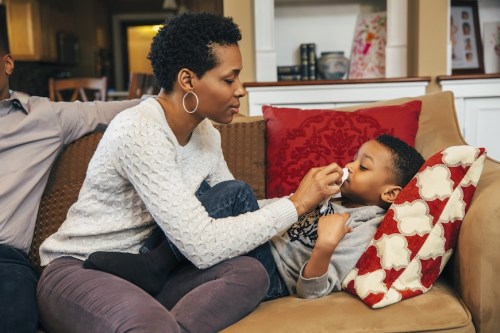Measles outbreak leads health officials to declare a state of emergency in Washington
How did the measles outbreak get this bad? Wasn't the disease wiped out? Here's how we got here, and what you need to know about staying safe.

When it comes to childhood sicknesses, most parents expect their kids to suffer through a bout of chicken pox and the occasional ear infection. But measles? It’s 2019—didn’t we eliminate the disease in the United States? (Hint: We did.) Yet, here we are. On Tuesday, health officials declared a state of emergency due to a measles outbreak affecting two Washington counties, according to NPR. How exactly did this happen?
According to the Centers for Disease Control and Prevention, measles—a viral infection causing a fever, rash, and inflammation—was a major problem in the United States in the early 1900s, leading to about 6,000 deaths annually. But after the introduction of a safe and effective vaccine, in 1968, the number of people infected began to plummet. By 2000, the disease was declared eliminated in the U.S. (In countries where a vaccine isn’t readily available, measles is still common.)
NPR correlates the resurgence in measles cases with state laws allowing parents to opt out of vaccinating their children. To this end, the CDC is urging parents to vaccinate children as young as 1 year old. The problem with waiting until after you suspect the virus has been contracted, the nation’s health protection agency says, is that it may take up to four days for symptoms to appear. Meanwhile, children easily (and unknowingly) expose others to the disease. Measles is an airborne contagion with a 90 percent infection rate. It spreads so easily that an infected child who coughs in a classroom can infect another child who enters the room up to two hours later.
If your kids have been vaccinated, the measles outbreak isn’t something you have to worry about. (And adults rarely contract it.) In highly public places, such as airports, malls, and amusement parks, children who are too young to be vaccinated are particularly at risk for infection. Older children who have not been vaccinated are also at risk. Since the virus is contracted through coughing, sneezing, or simply being in the same room as someone who has it, avoiding it can be difficult. Unless, of course, you’re vaccinated.
While we’re on the subject about staying healthy, find out if you should exercise or drink coffee when you’re feeling under the weather.
Sign Up for Our Daily Newsletter
Get all the latest in wellness, trends, food, fitness, beauty, and more delivered right to your inbox.
Got it, you've been added to our email list.










